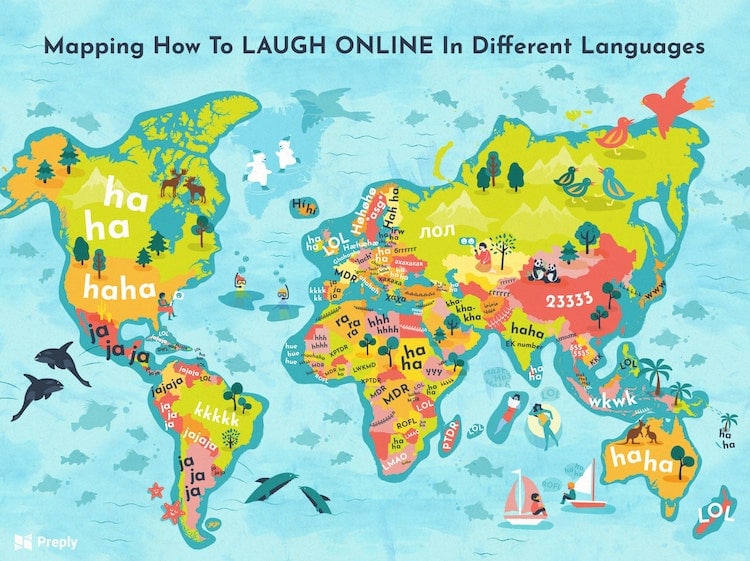[ad_1]

When it will come to in-human being discussions, laughter is universal. You might not speak the very same language, but you can realize one particular another by way of laughter. On-line humor, too, has grow to be a considerable portion of our communication with individuals from all in excess of the earth. If you discuss English, you most likely are likely to use onomatopoeia (“haha”), abbreviations (“LOL” or “LMAO”), or possibly you have a preferred emoji. But have you ever thought about laughing on-line in various languages?
Language-understanding web-site Preply compiled a listing of how to giggle online in 26 languages. It turns out that the onomatopoeia for laughter—”haha” is the most common—is spelled phonetically working with various languages’ respective alphabets. Having said that, there are also some other shorthand strategies of communicating laughter, dependent on the place you happen to be from and what language you speak. For occasion, in Thai, you could compose “55555” in its place of “Haha.” Why? It turns out that the amount five is pronounced like “haa” so the series of fives is a form of onomatopoeia.
Scroll down for additional approaches that folks chortle on-line in distinct languages.
Here is what laughing on line appears like in various languages:
Arabic
Laughter is created as “هههههههههه” in conventional Arabic, which is pronounced like “hahaha”. However the language is spoken in numerous nations close to the planet, they generally have their individual dialects that makes them exclusive to their particular region. This penned form of laughter is common within the Arabic speaking group although.
English
In English, it is frequent for men and women to create versions of “haha” (e.g. “hahaha” or “bahaha” or “haaaa”) as a reaction to something funny or “hehe” for a small mischievous giggle. Other forms of created laughter in on line speak contains “LOL” (which stands for “laughing out loud”), “LMAO” (“laughing my ass off”), and “ROFL” (“rolling on the flooring laughing”).
French
The most widespread is “MDR,” which implies “Mort de Rire” (“dead laughing”). To chuckle even tougher, there is certainly the abbreviation “PTDR“—Pété de Rire. Péte can suggest farting, but it can be generally a much more common variation of “casser,” which implies “to crack.” So, “PTDR” usually means “broken with laughter” and not always “laughing so really hard I farted,” but still…hilarious.
Greek
Greek on line laughter has all kinds of abbreviations. “Lol” in Greek letters is “λολ,” but more typical is “χαχα,” which is “haha.” For jokes or sarcastic laughter, Greek speakers favor “χοχο.” That final a person is situational, though “xoxoxo” also signifies “hugs and kisses” in Greek. There is also the sneaky laugh “χεχε” (“cece”), and the feminine giggle, spelled “χιχι” (“çiçi”). An evil giggle is “μπουχαχα” (“buxaxa”). Eventually, there is the mocking “χα0χα0χα0,” which is made use of in trolling situations (equivalent to “huehuehue” which is prevalent in Brazilian Portuguese).
Indonesian
The Indonesian spelling may well have appear about because of to the languages’ keyboard format. “Wkwk,” “wkwkwk,” “wakaka” and “xixi,” are well-liked, reportedly since it was easier for end users to sort “k” somewhat than “h,” which involves them to shift their forefinger away from its put on the keyboard.
Italian
For Italian speakers, the onomatopoeia for laughter is various, ensuing in the spellings “ahahah” and “eheheh,” because the language does not have the robust aspirated “ha” seem.
Jamaican Patois
As an English-primarily based creole language with West African influences, speakers of this language use the abbreviation “DWL,” which stands for “dead wild laugh.”
Korean
In Korean, is widespread to publish laughter as ㅋㅋㅋ (“kkk”) and ㅎㅎㅎ (“hhh”). When Koreans use the Latin alphabet in their writing, they publish their laughter as “k-k-k-k-k-k.”
Polish
Polish young adults will from time to time use the term “Heheszki,” meaning “kicking and laughing.” For the most aspect, even though, they use more English slang like “haha.”
Spanish
Laughing is represented with “jajaja,” but you also have choices. To express irony, Spanish speakers use “jejeje,” or “jijiji” for a a lot more mischievous laughter.
Thai
In Thai, the number five is pronounced “haa,” so Thai speakers form their laughter as “55555.” To signify that they are laughing a whole lot, they increase a additionally sign at the end (like this: “55555555+“).
Turkish
Like in numerous other languages, on line laughter in Turkish can be published as “hahaha” or in reverse as “ahahah.” Other fewer universally common approaches that laughter is shown is “jsjsjsjs” and “weqeqwqewqew.” A different appealing way that Turkish speakers talk laughter is by pressing a random string of keys on their keyboard to end up with anything like this: “dksajdksajdoşad.”
Ukrainian
In Ukrainian, laughter is prepared as “axaxaxax,” but, like Spanish, you can find also the choice for a unique tone: “азаза,” written in Cyrillic figures, signifies sarcastic laughter.
Vietnamese
“Hihihi,” is the most widespread, but there are also spellings for laughing in various feelings. You can find “khà khà khà” (like the English “hehehe”), “hê hê” (laughing proudly), “hì hì” (a weak snicker) or “hô hô.”
For the absolutely explained checklist of how to chuckle on-line in 26 languages, pay a visit to Preply.
Preply: Site | Facebook | Instagram
h/t: [Neatorama]
Similar Posts:
Comedian Artist Maps the Heritage of Languages with an Illustrated Linguistic Tree
Most Frequent Languages Spoken Close to the Environment and Their Indigenous Speakers
This Earth Map Displays You the Name of Each Country in Its Have Formal Language
https://platform.instagram.com/en_US/embeds.js
[ad_2]
Supply connection



